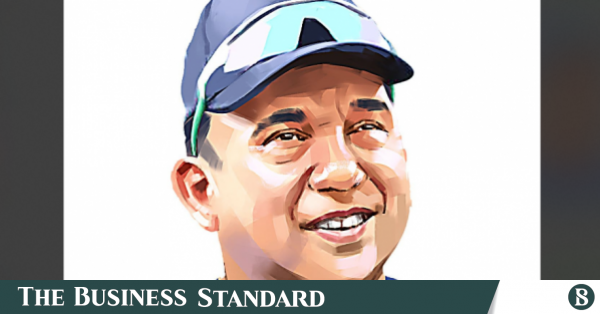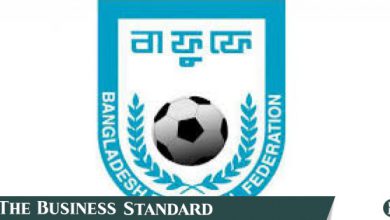‘I never want to lose’

Khaled Mahmud Sujon, a former captain of the Bangladesh national cricket team, has held many roles, including coach and BCB director. To many in Bangladesh’s cricket scene, he’s known as ‘Chacha’ (uncle). Initially, this nickname came from a distant relative and teammate during the Under-19 stage, but over time, he became ‘Chacha’ to many. In a literal sense, he has been a guardian figure to many cricketers. From Mahmudullah Riyad to Mehrab Hossain Jr., Forhad Reza, Taskin Ahmed, Mustafizur Rahman, Soumya Sarkar, Towhid Hridoy, and Tanzid Hasan Tamim, Sujon has played a significant role in shaping their careers.
At one point, Sujon was even called a father figure for bringing in players directly and providing them with opportunities. His journey in Bangladesh cricket, as a player, organiser, and coach, spans many years. After retiring from playing, this former all-rounder took up a job at the BCB, eventually becoming a director. He has also served in various capacities, including interim head coach, assistant coach, national team manager, and team director.
In 2013, Sujon became a BCB director through elections and has since been serving as the chairman of game development. He was also the vice-chairman of the cricket operations department. However, he no longer holds these positions. On Wednesday, Sujon resigned from his role as BCB director, citing personal reasons. A few days before this, Sujon spoke with The Business Standard, discussing his playing career, coaching and organisational roles, successes and failures, his passion for nurturing cricketers, and Bangladesh’s current standing in Test cricket.
Sujon shared that his organising instinct was with him from a young age, saying, “I didn’t start out thinking I would become an organiser. Even when I was a player, I had a knack for looking after other players, keeping an eye on the clubs, and building teams. After I stopped playing, I moved into coaching. When I work with any club, I have a preference; I want certain types of players. I’m with Beximco, and I oversee several of Beximco’s teams.”
“As the head of coaching for Beximco, I look after their first, second, and third division teams. There’s also the Premier League team, Shinepukur, and now Gulshan. When building a team, I handle budgeting, determining the team’s composition, where the players will stay, what they will eat – I’m involved in everything. Whether or not that makes me an organiser, I don’t know. I’ve played cricket and been around it for so many years. I enjoy being involved with cricket, it makes me happy. When I can provide an opportunity to a player, it gives me joy. When someone from outside Dhaka performs, I feel proud that I was able to help them rise.” he said.
Sujon believes that the leadership skills he developed as a player help him in his coaching and organisational roles. In his words, “It all helps. When I was just a player, I didn’t have to think about so many things. But when I became a captain, I definitely had to speak with each player individually. In the national team, I had to be even more involved. That experience helps me greatly now. Because of those leadership qualities, I can handle things well. If someone isn’t doing well, I talk to them one-on-one and try to help. In Abahani, my relationship with the players is better than that of just a coach. Our conversations are more like those between a father and son. I know a lot about their personal lives, and we discuss those things too.”
In 2007, after retiring from cricket, Sujon joined the Bangladesh Cricket Board (BCB) as the Operations Manager of the Cricket Academy (now known as the HP unit), where he served for four and a half years. Sujon described his experience as follows: “After I retired, I joined the BCB as an employee. I was the Operations Manager of the Cricket Academy, which was around 2007. I worked at the Board for four and a half years, serving as both Operations Manager and National Coach. Later, I became the Head Coach of the Bangladesh ‘A’ team. Although I was still the Operations Manager, I held several other positions at the same time.”
Although he was the head of one department, Sujon always aimed to help all the divisions at the BCB. He explained, “After working as an interim BCB director, I was elected to the Board. Here, I am the Chairman of Game Development, and Vice-Chairman of the Cricket Operations Department, and at times, I have also chaired the Tournament Committee and the Umpires’ Committee (on an interim basis). After being elected, I was given the Game Development responsibility and have been working in that role since then. Previously, I used to assist all the departments. I help Nadel Bhai in the Women’s Division, and I am also involved with the Tournament Committee. If the committee doesn’t have a head, I would take the lead. I assist Inam bhai with the Bengal Tigers.”
Sujon continued, “I don’t believe one needs to be the chairman of a department to work. I have always maintained relationships with everyone and worked on various matters. Perhaps now the chairmen don’t call or don’t feel the need to, but earlier, I used to be involved in small tasks for every committee. I believe that, as a director, one should have responsibilities in every division. I enjoy working in cricket, whether or not I hold a chair. The only areas I have never been involved in are logistics or finance. Since I am based in the field, my work has always been field-centric.”
Reflecting on his experience as a BCB director, Sujon said, “I never thought I needed to become a director of the cricket board. My friends and well-wishers encouraged me to run for the position. At the time, I didn’t have a club, and everyone at the club I was affiliated with wanted to elect me. Then the players’ quota was introduced, and Lipu bhai was in charge. I wondered if I could stand against Lipu bhai, as he had been on the Board for a long time. However, everyone gave me the courage to run for the position. I made up my mind and became very serious about the election because I never like to lose. I’ve always fought to win, no matter the battle.”
“I had to campaign on my own, as I didn’t have much support. I travelled outside Dhaka, seeking votes from everyone. I worked very hard during that time and won against Lipu bhai by a large margin, which was a huge surprise for me. Since then, I have been on the Board, working primarily as the head of Game Development. The Development Department has seen significant success. Many people speak about the pipeline without knowledge, but there are still players in the pipeline. However, I must admit that the facilities I wanted have not yet been established. There is a shortage in that regard. As an organiser or director, I haven’t been successful because I couldn’t build the structure needed for a strong pipeline.”
As the head of Game Development, Sujon takes great pride in the Under-19 team. Mentioning their World Cup and Asia Cup victories, he said, “If we talk about success, the Under-19 World Cup win is certainly one of the biggest. It is the biggest achievement in the history of Bangladesh cricket. Even if it’s at the junior level, we are world champions. In one area, we are world champions, and that is at the Under-19 level. It happened under my supervision as the committee chairman. It’s something I am very proud of. We also became champions in the Under-19 Asia Cup, which is another proud moment for me. Under my supervision, several clubs have moved up from the first division to the premier league, which is another achievement for me. Sheikh Jamal was the unbeaten champion, and I was their coach. I also coached Shinepukur, who were undefeated champions, and in that team, Towhid Hridoy played in the Dhaka League for the first time. These achievements bring me great satisfaction. As an organiser, I’ve been involved with several clubs and have brought many cricketers to Dhaka, which I consider another success.”
For Sujon, scouting cricketers from different parts of the country and giving them opportunities feels like an addiction. In his words, “Since I work on cricket outside Dhaka and have been involved in an academy called Bangla Track in Rajshahi for the past 10-12 years, I see a lot of talent there. For example, both Towhid Hridoy and Tanzid Hasan Tamim were initially not part of the Under-19 team. These two are players from my academy, and when I saw them, I asked how these two boys were left out. On my recommendation, they were included in the team, and I was the Chairman of Game Development at the time. These two are now among the best players in Bangladesh. It feels really good when I think about it now.”
“In Rajshahi, I see many boys from underprivileged families who can’t even afford shoes or bats, but they are excellent cricketers. I brought them to Dhaka and gave them opportunities in many teams. Many of them have progressed from the second division to the first division or Premier League. Due to their circumstances, they might never have made it to Dhaka otherwise. Hridoy, for instance, grew up playing for Shinepukur. If that team hadn’t existed or if I hadn’t been in charge, I might not have been able to give Hridoy that opportunity. Many people work for Bangladesh cricket without seeking personal gain. They run the teams, and I believe that without the Dhaka League, Bangladesh cricket wouldn’t have come this far. People talk a lot about the BPL, but it came just the other day. It’s more of an entertainment league. Those who run and sponsor teams in the first, second, or third divisions of the Dhaka League deserve the highest praise. It’s because of them that Bangladesh cricket has reached this level. Beximco Group and Gazi Group are some of the major contributors.”
Recalling memories of running a local club during his youth, the former captain said, “We used to run a neighbourhood club, so I know how difficult it was. I brought umpire Mukul (Masudur Rahman Mukul) from Faridpur to play for our neighbourhood club. We had formed a qualifying team called Siddheshwari Krira Sangha. We would keep Mukul and another player at a friend’s house because we couldn’t afford to put them up in a hotel. Our friends and I managed the team together. So, as you can see, I’ve been an organiser since a long time. Organising was always in me from a young age, and my journey has been a long one. I come from a middle-class family, and playing cricket was tough for us. My father didn’t have the money to buy me a bat or shoes. I know how difficult it is for a boy.”
As a child of a middle-class family, Sujon had his own struggles with cricket. He described it like this, “My father didn’t want me to play because he was more concerned about my studies. When I became the captain of the Bangladesh Under-19 team for the England tour, my father was shocked. He said, ‘When did you start playing cricket like this and become the captain?’ I used to hide my bat and clothes in different shops and sneak out to play cricket. When my father finally realised what I had achieved, he was very proud of me. But overall, I know how hard it was. In our time, we didn’t get paid. When I would ask for money, I would often get scolded. They would forget after giving their time, and I used to feel like a beggar. We went through so much hardship for fifty thousand or one lakh taka.”
While sharing stories of discovering players like Mahmudullah, Taskin, and Mustafizur, Sujon said, “When Taskin used to bowl in the nets as a young boy, I really liked him. He was just a kid, but he bowled fast in the nets, and it was amazing to watch. I first gave him a chance in the BPL with Chittagong Kings, where I was the coach. Everyone said he was just a young boy, raw and inexperienced, and hadn’t played much. The day before I played him, there was some tension in the team, as no one was willing to let him play. But I fought to give him a chance, and in his first match, he took four wickets. From there, Taskin developed into a big player.”
“With Mustafiz, Chandika Hathurusingha came to me asking for a left-arm fast bowler. Mustafiz was already playing for the national team, as he had that ability. But I’m not sure if he would have debuted so soon. I suggested both Abu Hider Rony and Mustafiz to Hathurusingha. When he asked about their qualities, I shared my insights. Then Hathurusingha wanted to see Mustafiz bowl. I called Mustafiz and asked him to join the Bangladesh nets in Dhaka. After just six deliveries, Hathurusingha came to me and said, ‘He’ll play in the T20 against Pakistan.'”
Sujon doesn’t want to take credit for these moments. He sees himself as a bridge between cricketers and the team. Speaking about introducing Soumya to Hathurusingha and helping several senior players get opportunities, Sujon said, “I’ve introduced a few players. I introduced Soumya to Hathurusingha. At that time, Soumya was playing for Prime Bank Cricket Club. I told Hathurusingha, since you’re looking for a top-order batsman, there’s a boy who bats really well. That day, Soumya played well in the Premier League, and Hathurusingha saw his innings and told me he would be in the team. So, I acted as a bridge. But Hridoy, Tamim, they were directly my players.”
“Going back even further, I brought up players like Mahmudullah Riyad, Arafat Sunny, Mehrab Hossain Junior, and Forhad Reza very closely. Many used to say I was like their father, and I enjoyed that at the time. I played for City Club for a year. Even though I performed well, the team kept losing, despite having senior, well-known cricketers. After being approached by the team, I told them, ‘I’m the captain, and I’m performing. If you ask me, I won’t play any of the senior players. I want to play the youngsters.’ That’s when I mentioned Mehrab, Riyad, and Abir (Shahriar Nafees). After that, we won nine consecutive matches with that team. In head-to-head competition, we finished runners-up. So, I’ve helped bring up many cricketers.”
Recalling the story of how he became known as “Chacha” (Uncle) to many cricketers, Sujon said, “When we used to play Under-19 cricket, there was a player named Sheikh Halim Shah who used to call me brother. One day, he asked if I knew anyone named Ayna-Moyna. I didn’t, so he told me to ask my father. When I got home, I asked my father who Ayna-Moyna was. My father said, ‘Ayna-Moyna are your aunts, my sisters.’ They were distant relatives. Later, I told Halim Shah that Ayna-Moyna were my aunts. He then said, ‘They’re my grandmothers, so that makes you my uncle.’ That’s where it all started. From then on, more and more people started calling me Chacha, and eventually, the name stuck.”
Talking about the state of regional cricket after Bangladesh gained Test status, Sujon explained, “We haven’t been able to improve the facilities or develop a proper structure. Things like building indoor training centres or new grounds haven’t been accomplished. To produce good players, you need good facilities. The national team trains in Dhaka, where 25-30 players can practise, but others, like the women’s or Under-19 teams, only get the opportunity occasionally. We need such facilities across the country. A boy in Chandpur has to come to Dhaka to bat, as there are no such opportunities outside. This is my regret—that I couldn’t improve these things while working in game development. Our Test cricket culture hasn’t grown or progressed due to this.”
Reflecting on the differences between being a cricketer and a coach, he shared, “As a player, I enjoyed it, but there was also a lot of frustration. I think I’m probably the only national team player to have been dropped 10 times and returned 10 times in a short span. If I had one poor performance, I was dropped, with many people always against me. Even after being the top all-rounder in a tournament, I was dropped while senior cricketers remained. I only found out later why and how I was dropped. As a child, I always spoke my mind, and many thought I was rude, but I was just being honest. Despite all this, I loved playing. Coaching, however, comes with different responsibilities, like building a team and setting strategies, but being a player was tougher. Though I do enjoy coaching too.”





